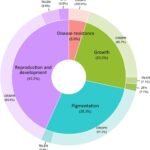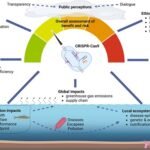USA.- Michigan State University scientists have released a new genetic engineering toolkit for the algal species Nannochloropsis oceanica. It is of interest for the production of biofuels and other oil-based chemicals.
“Nannochloropsis is a great candidate for useful applications. It is quick to grow. It is easy to study. And it produces a lot of oil, which is interesting for industrial production,” said Eric Poliner, a former graduate student in the laboratories of Eva Farre and Christoph Benning.
The toolkit relies on CRISPR, a set of tools to edit genes in an organism’s DNA. With it, scientists insert a gene construct in an organism. The construct includes both a guiding mechanism to precisely target stretches of DNA for mutations and instructions to delete, expand or change them.
“We insert mutations with the help of episomes, circular pieces of DNA foreign to Nannochloropsis,” Poliner said. “Our algal cells can maintain that foreign DNA for a while, which is unusual, as most other algae can’t.”
As the algal population multiplies over the generations, a high percentage loses the foreign DNA. Yet, the mutation brought in with the construct survives in subsequent generations, becoming an integral part of the genome.
This feature would address public safety concerns in case engineered algae are ever mass-produced in open ponds. They might not be considered genetically modified organisms, due to the lack of foreign DNA.
Poliner said that the genetic toolkit is a bit of a first. Although there exist robust toolkits to manipulate microorganisms, like yeast or E. coli, those do not yet exist for algae.
“There are several university labs and biotech companies now working on Nannochloropsis. The hope is that the toolkit will help the research community to expand,” Poliner said. “My goal is to help researchers to do their advanced studies. I don’t want them to reinvent the wheel, so the information is easily available to the community.”
Stay Always Informed
Join our communities to instantly receive the most important news, reports, and analysis from the aquaculture industry.
Contact:
Igor Houwat
MSU-DOE Plant Research Laboratory
office: (517) 353-2223
houwatig@msu.edu
Eva Farre: https://plantbiology.natsci.msu.edu/directory/eva-farre/
Christoph Benning: https://prl.natsci.msu.edu/people/faculty/christoph-benning/
Source: Michigan State University
Editor at the digital magazine AquaHoy. He holds a degree in Aquaculture Biology from the National University of Santa (UNS) and a Master’s degree in Science and Innovation Management from the Polytechnic University of Valencia, with postgraduate diplomas in Business Innovation and Innovation Management. He possesses extensive experience in the aquaculture and fisheries sector, having led the Fisheries Innovation Unit of the National Program for Innovation in Fisheries and Aquaculture (PNIPA). He has served as a senior consultant in technology watch, an innovation project formulator and advisor, and a lecturer at UNS. He is a member of the Peruvian College of Biologists and was recognized by the World Aquaculture Society (WAS) in 2016 for his contribution to aquaculture.







